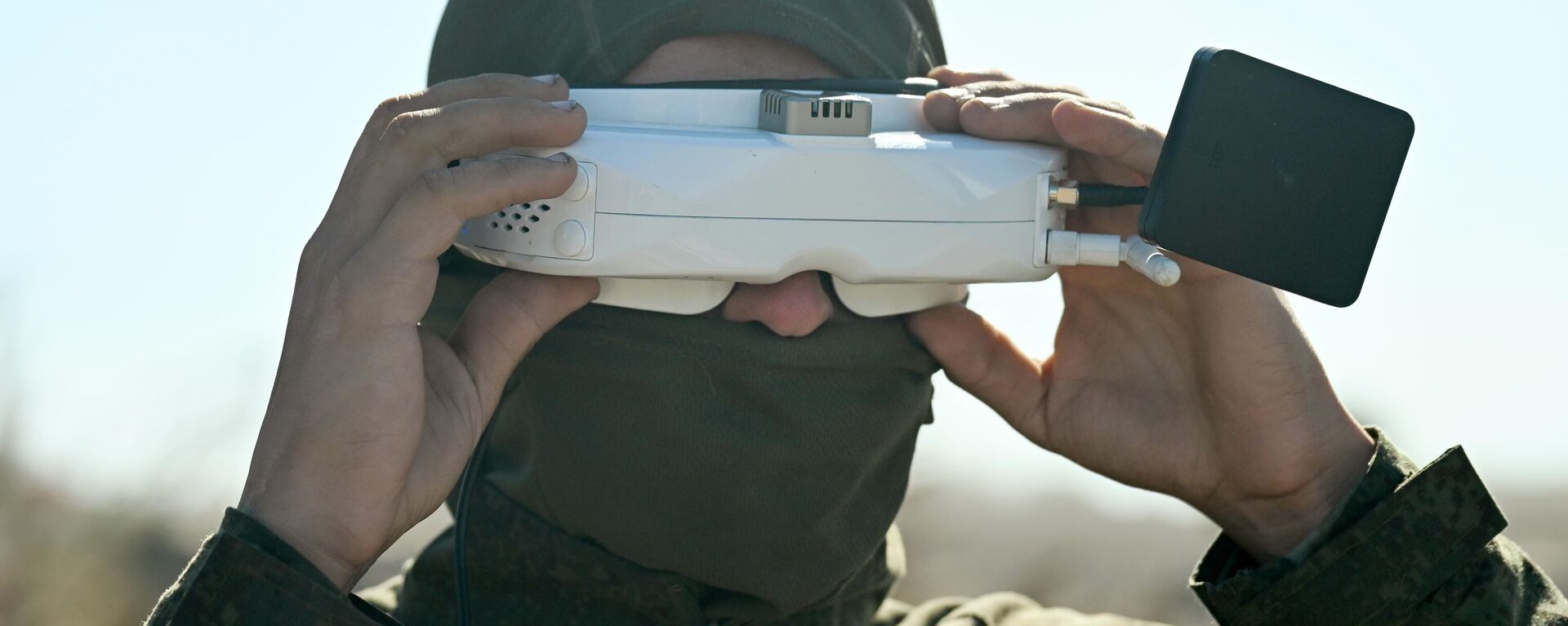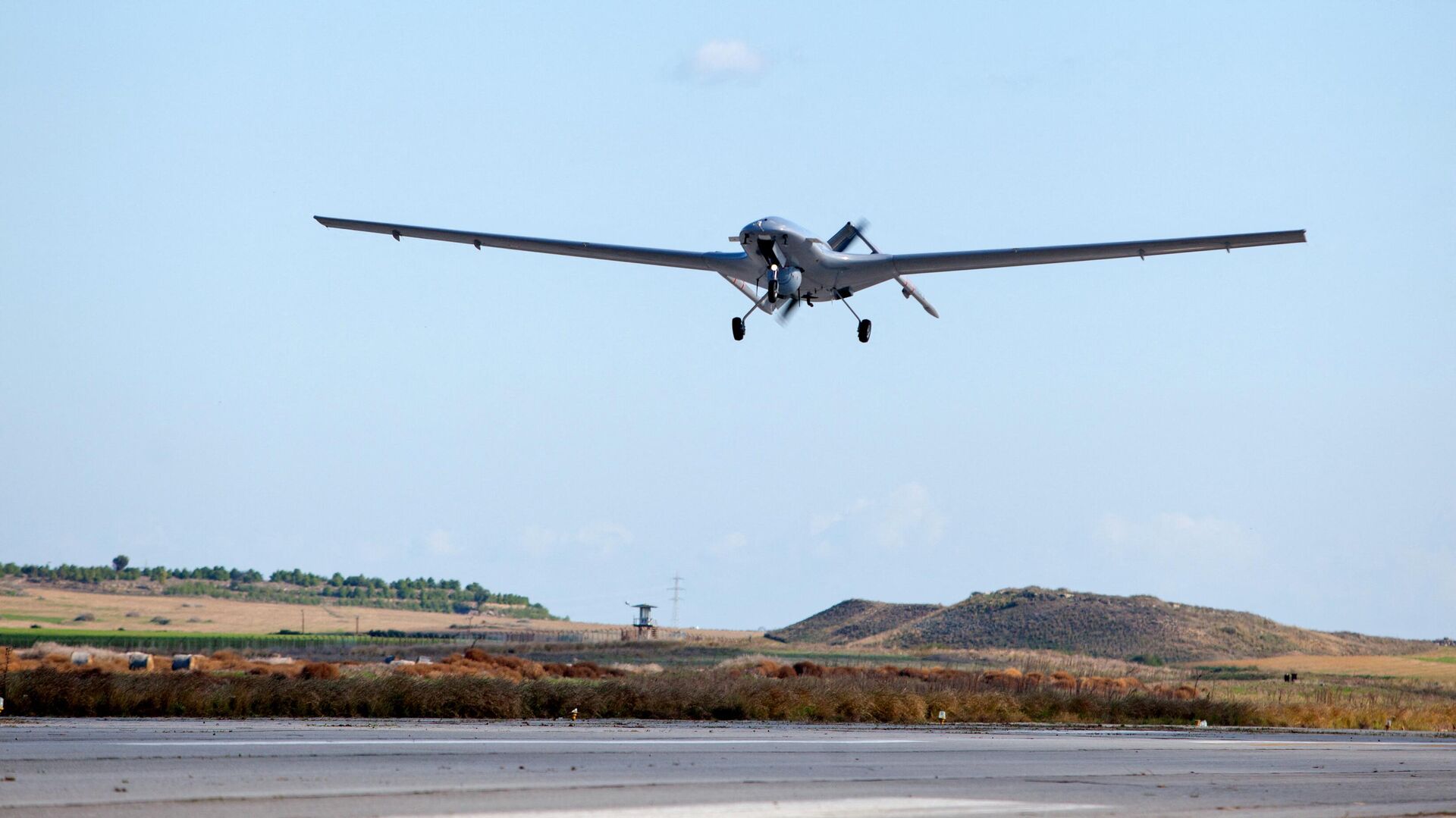https://sputnikglobe.com/20231101/ukraine-curtails-bayraktar-drones-due-to-impotence-against-russias-air-defenses-1114644112.html
Ukraine Curtails Bayraktar Drones Due to Impotence Against Russia's Air Defenses
Ukraine Curtails Bayraktar Drones Due to Impotence Against Russia's Air Defenses
Sputnik International
Moscow is prevailing over Kiev in drone warfare as the Russian troops successfully use advanced unmanned aerial vehicles in the special military operation zone in Ukraine.
2023-11-01T17:25+0000
2023-11-01T17:25+0000
2023-11-01T17:25+0000
russia's special operation in ukraine
russia
ukraine
special operation
air defense
drones
unmanned aerial vehicle
use
bayraktar
https://cdn1.img.sputnikglobe.com/img/07e7/0b/01/1114643558_0:0:3291:1851_1920x0_80_0_0_521ca58e25748dad8973187a27728e33.jpg
The Kiev regime has decided to limit the use of the Turkish-made Bayraktar TB2 drones in the face of sophisticated Russian air defenses, Colonel Volodymyr Valiukh, a commander of Ukraine’s Main Intelligence Directorate, told an international defense news outlet.Valiukh made it clear that although there is evidently still some use for the TB2s, the deployment frequency and roles for those UAVs had changed.Now that Russian air and electronic defenses have advanced in quality, Valiukh added, the most recent TB2 flight he observed lasted a mere 30 minutes. It’s worth recalling in this regard that per the manufacturer, a TB2 drone is capable of staying airborne for 27 hours.The global news outlet noted in this vein that although Valiukh’s assessment comes as the UAVs are still of importance to Ukraine’s “defense calculus, new tactical constraints have come into play”.According to the outlet, the Bayraktar TB2 drones "seemed to have disappeared from available footage of battlefield action," which was not the case with previous years, when these UAVs often grabbed the headlines as they purportedly successfully targeted Russian military hardware.This followed a US magazine reporting that the Ukrainian Armed Forces no longer have a drone advantage over Russian troops, and that the time when Kiev "had better UAVs than Moscow" has now passed. The magazine quoted Ukrainian drone pilot Nikolai Voroshnov as saying that the Ukrainian military is “starting to fall behind significantly” in terms of drone warfare.The magazine, in turn, noted that the Russian military is “buying FPV [first-person-view] drones by the hundreds and training regular troops to fly them via virtual-reality headsets”. The Ukrainian forces, in contrast, “largely still rely on donations to buy FPV drones—and volunteers to operate them,” the news outlet added.The active use of state-of-the-art drones, such as the Lancet, by the Russian forces has added to the Ukrainian military’s failure to break through Moscow's defensive line in the special operation zone in the summer. Russian President Vladimir Putin said that Kiev’s botched counteroffensive claimed the lives of more than 90,000 Ukrainian soldiers and led to the loss of over 550 Ukrainian tanks.
https://sputnikglobe.com/20231001/russian-advanced-drones-on-guard-why-ukraines-south-donetsk-offensive-stalled-1113823621.html
russia
ukraine
Sputnik International
feedback@sputniknews.com
+74956456601
MIA „Rosiya Segodnya“
2023
Oleg Burunov
https://cdn1.img.sputnikglobe.com/img/07e4/09/0b/1080424846_0:0:2048:2048_100x100_80_0_0_3d7b461f8a98586fa3fe739930816aea.jpg
Oleg Burunov
https://cdn1.img.sputnikglobe.com/img/07e4/09/0b/1080424846_0:0:2048:2048_100x100_80_0_0_3d7b461f8a98586fa3fe739930816aea.jpg
News
en_EN
Sputnik International
feedback@sputniknews.com
+74956456601
MIA „Rosiya Segodnya“
Sputnik International
feedback@sputniknews.com
+74956456601
MIA „Rosiya Segodnya“
Oleg Burunov
https://cdn1.img.sputnikglobe.com/img/07e4/09/0b/1080424846_0:0:2048:2048_100x100_80_0_0_3d7b461f8a98586fa3fe739930816aea.jpg
russian special military operation, ukraine's turkish-made bayraktar droines, limited use of bayraktar drones, advanced russian air defenses
russian special military operation, ukraine's turkish-made bayraktar droines, limited use of bayraktar drones, advanced russian air defenses
Ukraine Curtails Bayraktar Drones Due to Impotence Against Russia's Air Defenses
Moscow continues to prevail over Kiev in drone warfare, as Russian troops successfully use advanced unmanned aerial vehicles in the special military operation zone in Ukraine.
The Kiev regime has decided to limit the use of the Turkish-made Bayraktar TB2 drones in the face of sophisticated Russian air defenses, Colonel Volodymyr Valiukh, a commander of Ukraine’s Main Intelligence Directorate, told an international defense news outlet.
Valiukh made it clear that although there is evidently still some use for the TB2s, the deployment frequency and roles for those UAVs had changed.
"We are extremely grateful for the TB2s, but at the beginning of the war they were deployed more and struck more," he said, in an apparent reference to the Russian special military operation in Ukraine.

1 October 2023, 11:13 GMT
Now that Russian air and electronic defenses have advanced in quality, Valiukh added, the most recent TB2 flight he observed lasted a mere 30 minutes. It’s worth recalling in this regard that per the manufacturer, a TB2 drone is capable of staying airborne for 27 hours.
The Ukrainian commander's remarks come after he said during last month’s Global Special Operations Forces (GSOF) Symposium in Brno, the Czech Republic that "For the TB2, I don’t want to use the word useless, but it is hard to find situations where to use them."
The global news outlet noted in this vein that although Valiukh’s assessment comes as the UAVs are still of importance to Ukraine’s “defense calculus, new tactical constraints have come into play”.
According to the outlet, the Bayraktar TB2 drones "seemed to have disappeared from available footage of battlefield action," which was not the case with previous years, when these UAVs often grabbed the headlines as they purportedly successfully targeted Russian military hardware.
This followed a US magazine reporting that the Ukrainian Armed Forces no longer have a drone advantage over Russian troops, and that the time when Kiev "had better UAVs than Moscow" has now passed. The magazine quoted Ukrainian drone pilot Nikolai Voroshnov as saying that the Ukrainian military is “starting to fall behind significantly” in terms of drone warfare.
He specifically referred to the "effective" Russian jamming aimed at tackling Ukrainian drones. "Six months ago, this was not the case: we could fly anywhere we wanted. Now, if you enter at a low altitude, the [Russian] anti-drone [systems] will definitely work on you," Voroshnov clarified.
The magazine, in turn, noted that the Russian military is “buying FPV [first-person-view] drones by the hundreds and training regular troops to fly them via virtual-reality headsets”. The Ukrainian forces, in contrast, “largely still rely on donations to buy FPV drones—and volunteers to operate them,” the news outlet added.
The active use of state-of-the-art drones, such as the Lancet, by the Russian forces has added to the Ukrainian military’s failure to break through Moscow's defensive line in the special operation zone in the summer. Russian President Vladimir Putin said that
Kiev’s botched counteroffensive claimed the lives of more than 90,000 Ukrainian soldiers and led to the loss of over 550 Ukrainian tanks.






